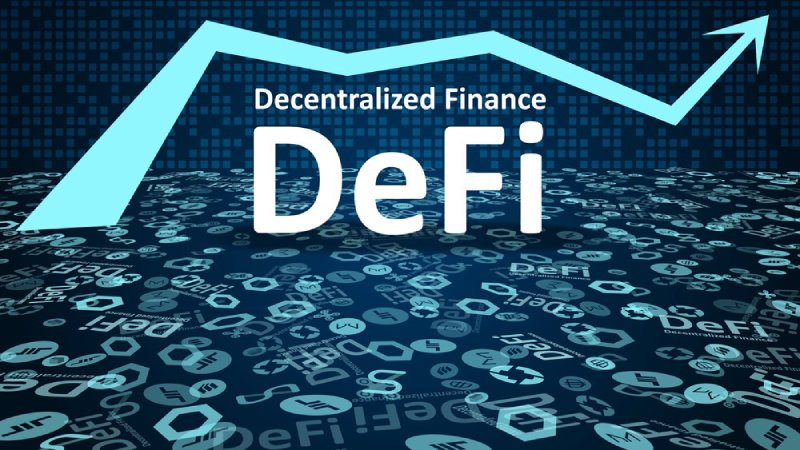Cryptocurrency
Banking and Finance Industry’s Future with Decentralized Finance

- Introduction
The future of banking and finance is being shaped by decentralized finance or DeFi. DeFi provides a transparent, easily accessible, and effective replacement for conventional financial systems by using blockchain technology. This article examines the fundamental ideas of DeFi as well as its key components, challenges, and its potential impact on banking and finance in the future.
- Gaining Knowledge about Decentralized Finance (DeFi)
DeFi is a movement that seeks to establish a transparent, permissionless, open-source, and decentralized financial services ecosystem that is accessible to all and runs decentralized. Using smart contracts on blockchain platforms, DeFi automates and carries out financial transactions without the need for middlemen, in contrast to traditional banking systems that depend on centralized organizations to handle transactions.
- Key Components of DeFi
The terms of the agreement between the buyer and seller are directly written into lines of code in smart contracts, which are self-executing contracts. They do not require middlemen because they automatically enforce and carry out these terms.
Platforms known as decentralized exchanges, or DEXs, let users trade cryptocurrencies with one another directly without the need for a central body to handle trade facilitation. When it comes to security and privacy, they outperform centralized exchanges.
Users can lend or borrow cryptocurrency using decentralized lending and borrowing platforms, doing away with the need for a conventional financial middleman. These platforms automate the lending and borrowing process with smart contracts, which minimize paperwork and expedite transactions.
Other significant DeFi applications are yield farming, which provides liquidity to decentralized exchanges in exchange for rewards, staking, which locks up cryptocurrency to support a blockchain network and earn rewards, and insurance, which enables users to safeguard their assets against various risks.
- Challenges and Risks in DeFi
DeFi has a lot of benefits, but it also has risks and challenges. Security is one of the main issues because smart contracts can be hacked and have bugs. DeFi’s growth is also threatened by legal and regulatory uncertainties because many governments are still figuring out how to govern this new technology. Furthermore, users with limited financial resources may find DeFi less accessible due to scalability issues and high gas fees on blockchain networks.
- The Role of Blockchain Technology in DeFi
DeFi is made possible in large part by blockchain technology, which offers a transparent and safe means of recording transactions. Because all transactions are recorded on an unchangeable, tamper-proof public ledger, blockchain ensures that bad actors can rarely manipulate the system. Furthermore, smart contracts can be used with blockchain to automate and enforce terms of agreements, thereby lowering the need for mutual trust.
- Adoption and Growth of DeFi
DeFi has become increasingly popular in recent years, and billions of dollars worth of value has been locked up in its protocols. Numerous factors, such as the rising demand for decentralized financial services, public interest in blockchain technology, and the possibility of large returns provided by DeFi protocols, can be credited for this growth. However, problems with user experience and regulatory uncertainty continue to prevent DeFi’s widespread adoption.
- The Future of Banking and Finance with DeFi
In the future, DeFi could completely transform the banking and finance sector by lowering the cost of financial services, boosting the efficiency of financial transactions, and facilitating greater financial inclusion. DeFi will need to overcome its present obstacles in addition to carrying on with its innovation and evolution if it is to reach its full potential. As blockchain technology continues to advance and interest from institutional and retail investors rises, the future of banking and finance appears to be becoming more decentralized.
Conclusion:
DeFi is a decentralized, inclusive alternative to conventional banking systems that signifies a paradigm shift in the financial sector. DeFi keeps expanding and innovating despite obstacles like security and regulatory concerns, promising a time when financial services will be more widely available, effective, and transparent.
-

 Gadget4 weeks ago
Gadget4 weeks agoAfter Grand Success on BLDC Ceiling Fan, Eff4 Is Launching Smart Bulb
-

 Festivals & Events4 weeks ago
Festivals & Events4 weeks agoGoogle Celebrates Cherry Blossom Season with Animated Doodle
-

 Business2 weeks ago
Business2 weeks agoPrakash and Kamal Hinduja: Driving Social and Environmental Change
-
Education3 weeks ago
Fred DuVal: University Leadership as a Critical Resource for Climate Change Research and Life-Saving Solutions
-

 Health2 weeks ago
Health2 weeks agoThe Hinduja Brothers Commitment to Global Health: Empowering Communities Across Borders
-

 Cryptocurrency3 weeks ago
Cryptocurrency3 weeks agoDesigned For The Masses: How Akasha (AK1111) Is Unlocking Crypto For The Next Billion Users
-

 Cryptocurrency3 weeks ago
Cryptocurrency3 weeks agoNexaglobal & Future World Token (FWT): Could This Be the Next Big Crypto Investment of 2025?
-

 Sports4 weeks ago
Sports4 weeks agoWomen’s NCAA Tournament 2025 Sweet 16: Full Schedule, Fixtures, Teams, Bracket, and How to Watch March Madness Basketball Match Live

















